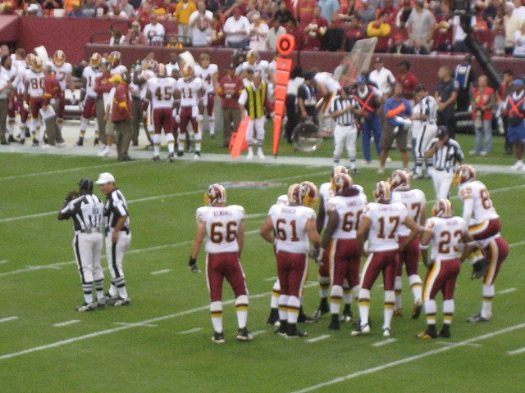
April 14, 2017; Washington Post
In 2014, facing continuing criticism of the name of the Washington, D.C., NFL football team, Daniel Snyder, owner of the team, announced the formation of the Washington Redskins Original Americans Foundation. In a letter published on the team’s website, he explained the logic behind his decision.
For too long, the struggles of Native Americans have been ignored, unnoticed and unresolved. As a team, we have honored them through our words and on the field, but now we will honor them through our actions. We commit to the tribes that we stand together with you, to help you build a brighter future for your communities. The Washington Redskins Original Americans Foundation will serve as a living, breathing legacy—and an ongoing reminder—of the heritage and tradition that is the Washington Redskins. I’m glad to be able to launch this vital initiative today.
At the time, Rick Cohen, writing for NPQ, asked some critical questions about the real motivations behind the foundation’s formation.
Will U.S. philanthropy greet the Washington Redskins Original Americans Foundation as a legitimate addition to the nation’s charitable response to the needs of Native Americans? Or will philanthropy object to the adoption of a foundation structure for the purposes of giving a charitable veneer for maintaining a name that many Americans, Native Americans and others, consider objectionable, contrary to the view of Snyder and his foundation CEO?
Now, with a few years of operation under the foundation’s belt, do we have any answers?
Sign up for our free newsletters
Subscribe to NPQ's newsletters to have our top stories delivered directly to your inbox.
By signing up, you agree to our privacy policy and terms of use, and to receive messages from NPQ and our partners.
The Foundation has donated to a number of tribal projects in multiple locations. In its first year, it made 25 grants totaling $3.7 million, including more than $500,000 to the Zuni Tribe of New Mexico for “economic development, education and youth activities, health and community services.” But in its second year, the Foundation’s effort was cut in half, dividing $1.6 million among 14 tribes.
Is the sharp decline an indication that Mr. Snyder, the foundation’s sole donor, has lost some of his initial enthusiasm? Or, has he not seen enough progress in taking the stigma off his team’s name? In response to a Washington Post inquiry, a foundation spokesperson said, “The foundation gave…products and services to Indian lands where the most people can be accommodated…As we hone the mission of the foundation, we will continue to try to find areas that have the highest impacts…sometimes, it’s how you give and not how much.”
Has the charitable investment cooled the controversy over the team’s name? For some in the Native American community, the connection of this charity to the team remains a hot issue. In its first year, the foundation had given the Indian National Finals Rodeo a much needed $200,000 grant. In the midst of negotiating a much larger, multi-year gift, the Rodeo received strong opposition to continuing its relationship with the foundation from other tribal groups, which saw the partnership as giving legitimacy to a racial slur. The Washington Post reported that the rodeo’s formal letter ending its funding relationship “called the foundation’s financial support ‘not truly philanthropic’ and said Snyder’s organization was ‘deliberately named to invoke this slur and to ultimately make legitimizing that slur the consequence of accepting the foundation’s support.’” Internal opposition to a relationship with the WROAF caused several other first-year recipients to refuse to continue on in this relationship.
For other tribes, the foundation’s efforts were seen as meaningful and without any connection to the team’s name. Alice Tybo, council member for the South Fork Band of the Te-Moak Tribe of Western Shoshone in Nevada, told the Post, “It’s been a good relationship. The $148,000 in support her tribe received over two years paid for a van as well as a playground with the Redskins logo on it. People love it. We’ve never received any backlash at all.”
Millions of dollars going to good projects should not be scoffed at. Yet by naming his new effort as he did, The Washington Redskins Original Americans Foundation, Snyder made the question of his motives inevitable. He could have chosen to funnel his newfound charitable passion through the Snyder Family Foundation, which has been in existence since 1998, or form a new organization with no overt connection to the controversial name of his team. In choosing to make accepting “Redskins” contingent with any philanthropic funding, Snyder made his motives an issue, and nothing in the first year of operations has made it less important. We are still left wondering, as Rick Cohen did, if this is “nothing more than a ploy by the owner of the third-most-valuable NFL franchise in the nation to maintain a name that many Americans view as racist and insulting to ‘original Americans.’”—Martin Levine












